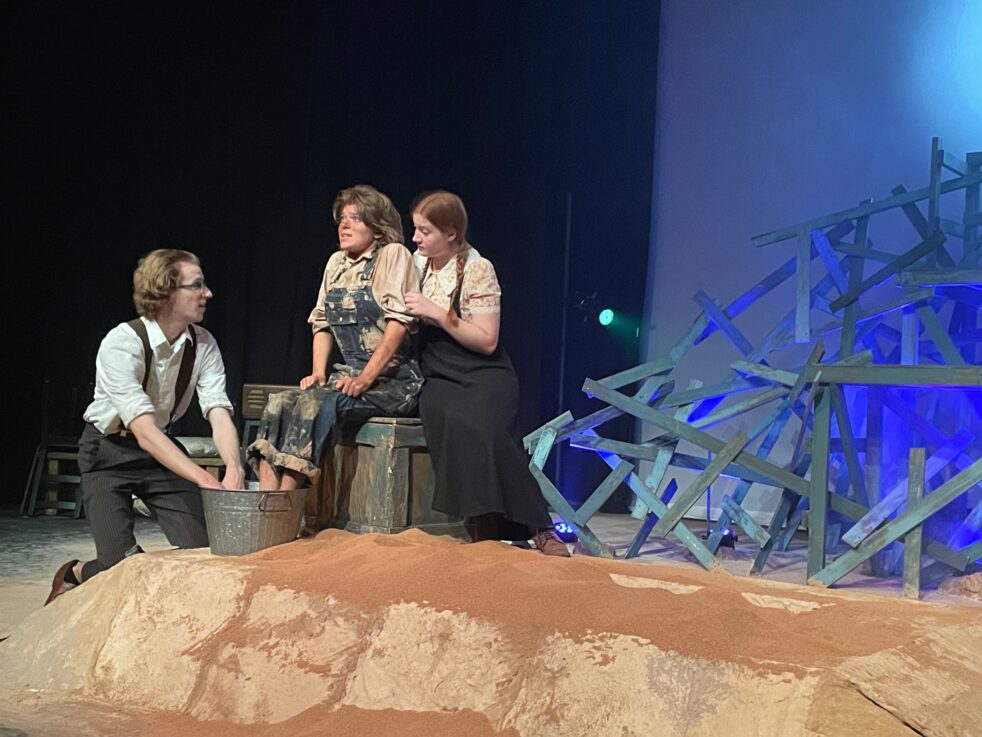Editor’s Note: This article contains spoilers for “The Diviners.”
Employing unconventional advertising techniques such as asking those passing by on Tech Green if they like feet or hinting at “business beans” on their advertisement board near Kaldi’s, DramaTech’s performance of “The Diviners” sets itself apart through its clever use of humor and unique interpretation of the historical fiction genre.
The play tells the story of a small town in the 1930s, as a mysterious man comes into town. The town soon discovers that this mysterious man, C.C., was a preacher for the last 12 years of his life but in the past three months, he has decided to cast off this previous profession in search of a new life.
The town members have a variety of reactions to this development. One family, the Laymans, hires him as a helping hand at their repair garage. Other town members, namely some of the women in town who run a dry goods store and a diner, take him to be the answers to their decade of praying since the town’s church burned down. In particular, Norma Henshaw speaks to how much she misses the role that the old church had played in her life.
Throughout the play, Norma alludes to the fact that she had been praying for such a miracle to save one of the boys in the town, Buddy Layman.
His need for salvation is twofold; as a small child, his mother died saving him from drowning in the river so Buddy developed a crippling fear of water that seemingly prevented him from bathing properly since the incident with his mother. In turn, this lack of proper bathing led to a generic skin affliction that leads to the character suffering from constant itching throughout the play.
After being hired by Buddy’s father as help at his garage, C.C. commits himself to helping heal Buddy of his affliction. He tries to help Buddy’s father and sister convince him to bathe to aid in the healing of his skin problem, but Norma is convinced that C.C., having previously been a preacher, is instead committed to Buddy’s spiritual salvation (as he is the only member of the town who has not been baptized).
The show culminates in C.C. successfully getting Buddy to bathe in the river, the result of his commitment to earning Buddy’s trust throughout the story.
However, when Jennie Mae (Buddy’s sister) is sent by C.C. to find their father to inform him of the amazing development, Norma concludes that Jennie Mae is speaking of Buddy’s impending baptism, not bathing.
The show then cuts to C.C. successfully convincing Buddy to enter the river, but soon the women of the town descend onto the moment singing traditional baptism hymns. C.C. does his best to tell the women that they are misinterpreting the situation, but before he has the chance to successfully correct them, Buddy falls into the deepest part of the river. C.C. immediately dives in after him, but he was moments too late.
This particular moment gets to the meaning of the play, the deeper conversation about the role of religion, salvation and family. The play compels the audience to ask themselves what Buddy really must be healed from: what is the real solution to his struggles? The audience must ask themselves what they believe constitutes salvation, and who they think needs or deserves it.
While DramaTech’s rendition of the play maintains the same themes and tone as the original, they take a few small artistic liberties from the original script to make the play more entertaining to their collegiate audience. One of the primary plots of the show surrounds Buddy Layman’s rejection of both shoes and bathing, or water in any form.
Throughout the DramaTech performance, Buddy refers to his feet, more specifically his toes, as his “dogs,” a clear reference to the recent online trend of doing just the same. Additionally, the play is performed with a thin layer of irony, signaling to watchers to not take the show too seriously and to enjoy the comedy throughout the play without getting too weighed down with the heavy themes of religion and death.
DramaTech’s performance of “The Diviners” is comedic without taking away from the show’s themes of religion, salvation, life, death and healing. The show leaves audiences considering their notions of spiritual salvation, their relationship with the role that death plays in such matters and whether a figurehead like a preacher is necessary for meaningful religious worship.
